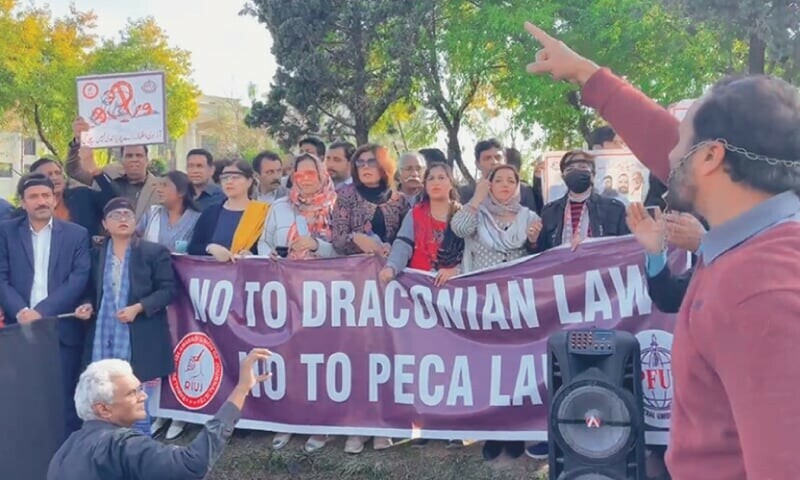Amnesty International has warned that the recently proposed changes to the country’s cybercrime laws could “further tighten the government’s grip over Pakistan’s heavily controlled digital landscape” if enacted into law.
The statement came on Friday after a controversial bill seeking to amend the Prevention of Electronic Crimes Act (Peca) was presented in the Senate amid a strong protest by the PTI-led opposition and a walkout by journalists from the press gallery.
The latest draft of changes to the Peca law was passed by the National Assembly on Thursday amid a walkout from journalists, who have assailed it as an “attack on freedom of expression”. The Senate yesterday referred it to the relevant standing committee.
In a statement, Babu Ram Pant, the deputy regional director of campaigns for Amnesty’s South Asia chapter, said: “The latest amendment to the draconian Prevention of Electronic Crimes Act (Peca) by the National Assembly will further tighten the government’s grip over Pakistan’s heavily controlled digital landscape, if passed by both houses of Parliament.”
Pant noted that the amendment “introduces a criminal offence against those perpetrating so-called ‘false and fake information’ and imposes a maximum penalty of three years’ imprisonment with a fine”.
“The vague and ambiguous framing of some elements of the offence together with a history of the Peca being used to silence dissent raises concerns that this new offence will chill what little is left of the right to online expression in the country,” the Amnesty official warned.
He further said that the legislation was “presented in the absence of any consultation or debate”, adding that it expanded the powers “previously available to the Pakistan Telecommunications Authority through the newly created Social Media Regulation and Protection Authority”.
“These provisions grant authorities power to block and remove content based on vague criteria, which will violate the right to freedom of expression and fail to meet standards of proportionality and necessity under international human rights law,” Pant further said.
The Amnesty official also compared the proposed changes to Peca with the Digital Nation Pakistan Bill, passed by the NA on Thursday.
The bill aims to create a digital identity for citizens — to centralise social, economic and governance data — and to provide for the transformation of Pakistan into a digital nation, enabling a digital society, digital economy and digital governance.
“These developments are in step with deployment of intrusive digital surveillance technologies and laws such as the Digital Nation Pakistan Bill, that fail to incorporate any human rights safeguards,” Pant said.
He added that Amnesty called on the authorities to “immediately withdraw the bill and instead engage in a meaningful consultative process with civil society to amend Peca to bring it in line with international human rights law”.
Proposed changes to Peca
Section 26(A) stated: “Whoever intentionally disseminates, publicly exhibits, or transmits any information through any information system, that he knows or has reason to believe to be false or fake and likely to cause or create a sense of fear, panic or disorder or unrest in general public or society shall be punished with imprisonment which may extend upto three years or with fine which may extend to Rs2m or with both.”
The bill suggests dissolving the FIA’s Cybercrime Wing and setting up a new investigation agency. It also proposes the establishment of the Social Media Protection and Regulatory Authority (SMPRA), which would perform a range of functions related to social media such as education, awareness, training, regulation, enlistment, blocking and more.
According to the bill, the CMPRA chairman will have the power to order the immediate blocking of any unlawful content on social media, while the authority will have the power to block content that contradicts the ideology of Pakistan or incites citizens to break the law.
It will also be authorised to block unlawful content targeting members of the judiciary, armed forces, parliament or provincial assemblies. Content deleted during parliamentary proceedings cannot be reuploaded on social media.
The amendment also proposes the establishment of a Social Media Complaint Council. In cases where social media platforms fail to comply with directives, the authority will have the power to approach the tribunal for enforcement.
- Desk Reporthttps://foresightmags.com/author/admin/










